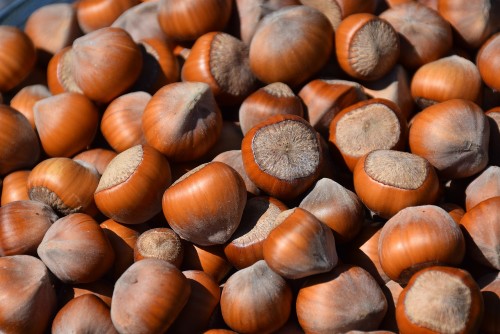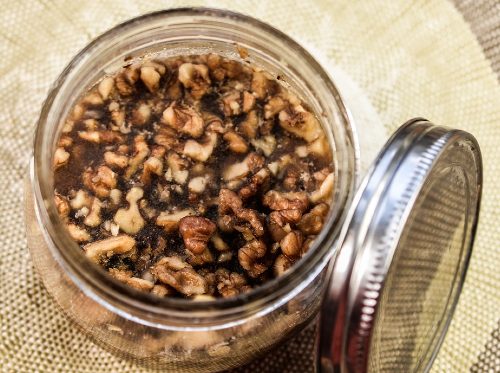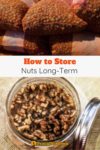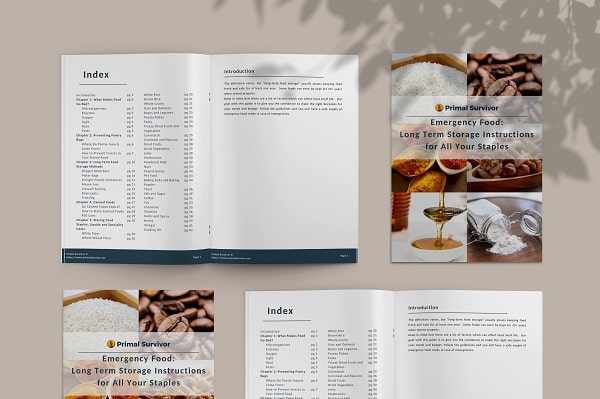My family eats a lot of nuts in cereal, baked goods, and pasta sauces. This means that we always have a large stockpile of nuts at home. Unlike our stockpile of salt, sugar, and flour, storing nuts so they don’t go bad is tricky.
Below is what you need to know about the long-term storage of nuts, including shelf life, drying, and storage.
Do Nuts Go Bad?
Yes, all types of nuts can go bad. Exposure to air, high temperatures, and light will cause the nuts’ fats and nutrients to degrade. Moisture will speed up the degradation process and allow mold and bacteria to grow.
The main reasons nuts go bad are:
- Rancidity: Nuts become rancid when their fats break down. Exposure to heat and air will make nuts go rancid very quickly.
- Pests: Pantry moths particularly love nuts. Some people have problems with rodents getting into their nuts storage as well. Read about how to prevent and get rid of pantry pests and how to mouse-proof your food storage.
- Mold: Nuts are prone to molds, which produce byproducts called aflatoxins. These compounds are carcinogenic and can cause liver damage. Breathing in aflatoxins can also irritate the lungs. High moisture is the leading cause of mold growth in nuts.
- Bacteria: In addition to mold, nuts can sometimes grow dangerous bacteria. Salmonella and listeria outbreaks have been linked to nuts.
- Absorbing odors: Nuts can sometimes absorb the smells of foods stored near them. While this doesn’t make them unsafe to eat, it does affect the taste. Never store nuts near chemicals or cleaning items. (1, 2)
Nut Shelf Life
Recommendations vary, but most sources say that nuts will last up to 3 months in the pantry, 1 year in the refrigerator, and 3 years in the freezer. However, the shelf life varies depending on the temperature, type of nut, and whether it is de-shelled, roasted, or whole pieces.
Temperature
Of all the things that affect nut shelf life, the temperature has the most significant impact. Even a slight increase in temperature can drastically reduce shelf life. The table below contains shelf life data taken from various studies. Note that not all nuts were studied at all temperatures.
Shelf Life in Months Stored at Various Temperatures
| Nut (Shelled) | 32F | 50F | 68F | 86F |
|---|---|---|---|---|
| Almond | 10 | 8 | 4 | No data |
| Cashews | 12 | No data | 6 | No data |
| Hazelnuts | 24 | 12 | No data | No data |
| Peanuts | 12 | 9 | 4 | No data |
| Pecans | 12 | 9 | 4 | No data |
| Macadamia Nuts | 12 | 12 | 5 | 0.75 |
| Pistachio | 10 | 3 | 1 | 0.25 |
| Walnuts | 12 | No data | 3 | No data |
Nuts in Shell vs. De-Shelled:

It shouldn’t be surprising that nuts in their shells last longer than de-shelled nuts. The shell allows nuts to make it through the winter to sprout in the spring. Oxygen and humidity will reach the nutmeat inside if the shell is removed.
Nuts still in their shell will last approximately 20-50% longer than shelled nuts.
Roasted vs. Unroasted:
Like storing coffee, roasting breaks down the natural oils in the nuts and starts the rancidity process. So roasted nuts will not last as long as unroasted nuts. Some types of unroasted nuts will last 4 times longer than if they were roasted.
Whole Nuts vs. Pieces:
Whole nuts will last twice as long as pieces of nuts. This is because pieces of nuts have more surface area and thus are exposed to more air.
Which Nuts Last the Longest?
Some nuts are more fragile than others because of the types of fat they contain. For example, even in optimal conditions, chestnuts can’t be stored for more than a month or two. If you want to keep nuts long-term, avoid stockpiling any that go bad quickly.
Nuts that go bad very quickly include pistachios, pine nuts, and chestnuts. Nuts that are better suited for long-term storage are cashews, hazelnuts, and unshelled walnuts. (4, 5, 6, 7, 8)
Storing Nuts Harvested from Trees
If you harvest nuts yourself, you’ll have to dry them before storing. Otherwise, the nuts will have too much moisture, and bacteria or mold could start growing.
After harvesting the nuts, immediately remove the hull so moisture from the hull doesn’t absorb into the shell. Then, spread the nuts on a screen or tray somewhere with good air circulation. Make sure rain doesn’t get on them. Every few days, break open a nut. If the nutmeat is still rubbery, then it needs to dry more.
Some people speed up the drying process by using a dehydrator. This heat treatment doesn’t cause rancidity when done at a low temperature. (12)
How to Store Nuts Long-Term
Nuts generally aren’t a good food for long-term storage. Even when stored in ideal conditions, they will still get rancid. It’s best not to keep nuts for more than 2 years. Only stockpile as many as you can rotate through in this timeframe.
If you want to store nuts for 2 years (or longer), you’ll need to use one of these methods.
Freezer
This is the easiest method of storing nuts long-term. The low temperature slows oxidation and mold growth. You should still put the nuts in an air-tight container or vacuum-sealed bag beforehand to protect against oxygen and moisture.
Root Cellar
Root cellars are great for storing unshelled nuts for a year or longer. The cool temperature in the root cellar preserves the nuts.
However, humidity can be a problem. Most root cellars need around 80% humidity to keep vegetables fresh. By contrast, nuts need a humidity of 55-70%. This room humidity will keep the nutmeat at its ideal humidity of 4-8% (hazelnuts and macadamia nuts need higher humidity).
If you plan on storing a lot of nuts in your root cellar, consider creating a separate area with controls for lowering the humidity levels. Keep the nuts in well-ventilated, rodent-proof bins.
Sealed Containers with Oxygen Absorbers
Oxygen absorbers are packets of iron that remove oxygen from the air. Putting the nuts in a sealed air-tight container, such as a Mylar bag, creates an oxygen-free storage environment.
The nuts will eventually go bad, especially if stored in high temperatures, but they will last much longer than if stored without oxygen absorbers. It varies, but expect most nuts to last approximately 2 years when stored this way at room temperature.
Read more about Mylar bags and oxygen absorbers for long-term food storage.
Store in Honey

If you only have a small number of nuts to store, you can put them in jars of honey. Because honey is a natural preservative and never goes bad, nuts can last 2+ years stored in honey — even at room temperature.
Also, see how to store honey long term.
Canning in Syrup
One other method of storing nuts long-term is to can them in sugar syrup. Sugar acts as a natural preservative. Canning also helps remove oxygen and creates an air-tight seal on the jar.
Read more about home canning here.
https://unsworks.unsw.edu.au/entities/publication/3dc3af96-5d70-489d-8b8e-caa5086f0890
https://aces.nmsu.edu/pubs/_h/H620/welcome.html
https://www.researchgate.net/publication/10625352_Investigation_of_Packaging_Systems_for_Shelled_Walnuts_Based_on_Oxygen_Absorbers
https://www.hindawi.com/journals/ijac/2011/813591/
https://pickyourown.org/canning_nuts_pressure.php
https://pubs.acs.org/doi/pdf/10.1021/jf60030a006
https://ifst.onlinelibrary.wiley.com/doi/abs/10.1111/j.1745-4549.2003.tb00529.x
https://edepot.wur.nl/462357



My husband has jars of almond stored in honey that are around 20 years old. I can’t imagine they are any good. I see 2+ years is how long they should be good, in this feed…. Should I convince home to throw them out?
I think as long as the seals aren’t broken they should be fine but I would open one first smell and then taste if good I wouldn’t worry about the rest.
Honey is a natural preservative, so those nuts might very well be good. The bigger question is why your husband is waiting so long to eat them. Rotate through food!
Although I have yet to try it, I expect another method would be to store the shelled nuts vacuum packed in coconut oil. The oil has a minimum 2 yr shelf life, longer at lower temps. So, in coconut oil in the fridge or even freezer seems like another option worth considering, especially if you don’t want them to be super sweet with honey.
So if I dry can my slivered almonds and pecans in Ball canning jars with oxygen absorbers and keep them in my dark basement, they will will be safe to eat over time? I’m trying to get away from storing so much in my freezer in case of blackouts this summer. Thanks!
Dry canning and oxygen absorbers seems like overkill. Plus, dry canning is controversial because of potential botulism risk. I’d just use OAs in the jars. Also, make sure you are packaging them on a low-humidity day so moisture doesn’t get into the jars.
Hi,
I’m planning to store my pecan and walnut halves in Mylar bags with oxygen absorbers and then freeze them. Can botulism occur in these conditions?
Thank you
So long as the nuts are very dry, then botulism shouldn’t be an issue. You don’t need to use OAs if keeping them in the freezer though. Just put them in Mylar or another airtight container so they don’t pick up weird smells from your freezer.
I always toss my nuts in the freezer in their original packaging bag, as I hate when the go rancid. I use a lot of raw slivered almonds. I recently found a bag in the freezer with a best by date of 3/2022. It is April. However, the bag was all blown up. Since nuts have a high moisture content could the puffed out (like a balloon) bag be botulism?
If they weren’t in oxygen-free packaging, then I doubt it was botulism. But that definitely sounds like some other bacteria! I would not eat those.
I’m confused. In 1 paragraph you say ” shouldn’t be surprising that shelled nuts last longer than unshelled nuts.” But in the same paragraph you say ” Nuts that are still in their shell will last approximately 20-50% longer than shelled nuts. Which is it? Shelled means the shells have been removed unshelled means they are still on.
Thanks for catching that mistake! It’s been fixed.
I have watched prepping/homesteading videos that claim storing nuts in air tight containers will cause botulism to grow. Is this true?
Moist foods stored in an oxygen-free environment can cause botulism to grow. For it to be an oxygen-free environment, you’d need to have an airtight container AND an oxygen absorber. Nuts should not have enough moisture to support botulism. Read more here: https://www.primalsurvivor.net/mylar-bags-food-storage/#Botulism_Risk
Great info.